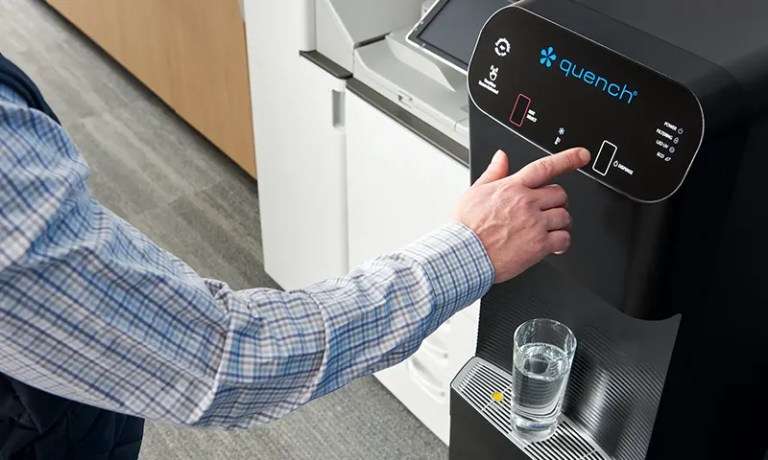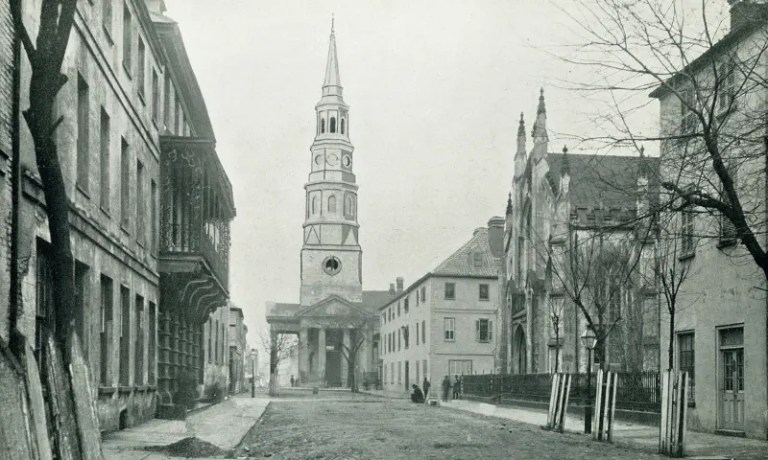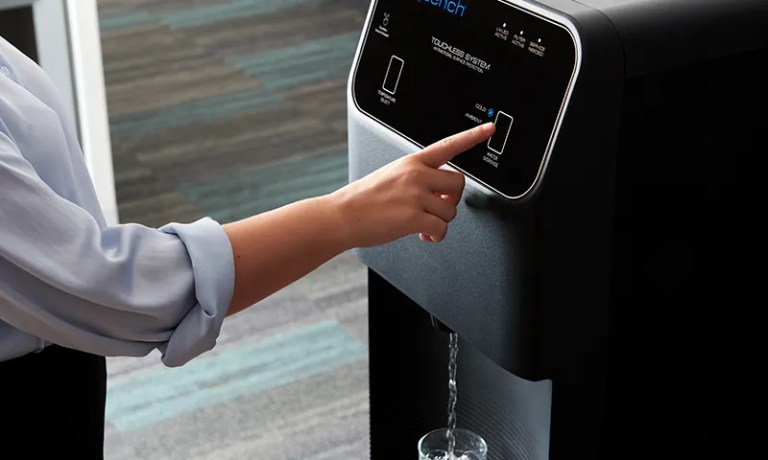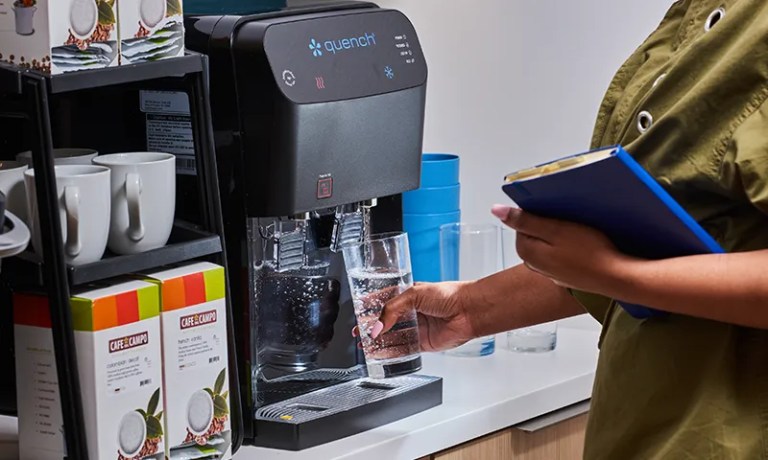The real cost of bottled water.
See how our bottleless water coolers compare.
Fill out this form or call 844-303-2841 to speak to a local Culligan Quench water expert. Fields marked * are required.

Take on-demand hydration to the next level. Culligan Quench bottleless water coolers and ice machines use advanced filtration and sanitization technologies such as carbon filtration and reverse osmosis to remove sediment, reduce lead and other chemical contaminants, and get rid of off-tastes and odors. By providing filtered water through a broad array of machines, our bottleless water coolers offer users countless consumption choices.
120,000+
customers
500+
service
technicians
80%
cost savings vs
bottled water delivery
1B+
bottles saved
per year
Offer a more sustainable solution for cleaner, better-tasting water on demand.
Fast, efficient, and reliable ice and water machines with advanced filtration.
Bottomless bubbles with built-in filtration for your modern workplace.
Better water makes better coffee. Give your people great-tasting coffee from best-in-class brewers.
Talk to an Charleston Culligan Quench water expert to find the best water solution for your space.
See how our bottleless water coolers compare.

Charleston has a rich history when it comes to its waterworks. In its early days, residents relied on wells and cisterns for their water supply. By the mid-19th century, the city began to develop a more sophisticated water system known as the Charleston Water System.
A reservoir and pumping station were built as part of the development of this modern water system. However, it wasn’t until the early 20th century that chlorine was introduced as a disinfectant, which significantly improved Charleston water quality.

While Charleston water quality is generally “safe” today, according to the Environmental Working Group, there are some contaminants present above safety limits set by national standards. The most common contaminants in Charleston water include nitrates, trihalomethanes, lead, arsenic, and pesticides. Nitrate contamination is particularly concerning, as it can cause a range of health issues, including anemia, birth defects, and even cancer. Trihalomethanes occur when chlorine combines with drinking water to kill bacteria, and can also be dangerous if consumed in high concentrations. While many of these contaminants occur naturally, some can be attributed to human activities, such as fertilizer runoff from agricultural sites and industrial waste from manufacturing plants.
Over 120,000 companies, big and small, trust Culligan Quench for cleaner, safer, and great-tasting water.

Worried about contaminants in your drinking water? We offer a full complement of water filtration and sanitization technologies to remove sediment, reduce chemical contaminants, including lead, and get rid of off-tastes and odors. Depending on your local water quality, your Water Expert may recommend our NSF-certified carbon filtration, which works great for water with TDS (total dissolved solids) levels under 250 ppm (parts per million) or our NSF-certified reverse osmosis (RO) filtration, which is the standard for water with TDS levels over 250ppm.

By creating a customized water filtration solution and tailoring your installation and service needs for your business, we can guarantee that Culligan Quench office water coolers produce crisp, clean, great-tasting water – and at a fraction of the price of bottled water delivery services. Go bottle free with Culligan Quench and you will save time, money, and the environment, plus you will have better tasting and safer drinking water!
Backed by 85 years of Culligan expertise, Culligan Quench has focused exclusively on providing businesses with the highest quality filtered water. This commitment to doing one thing well has made us the trusted water authority for over 75% of the Fortune 500. We offer the best bottleless water coolers, ice machines, sparkling water dispensers, and coffee brewers to fit any workplace. No matter your location, company size, or industry, we have a filtered water solution that is right for you
Play videoCharleston water is generally considered safe to drink. According to the Charleston Water System, the city’s water supply meets or exceeds safe drinking water standards at the federal and state levels. The treatment process filters and disinfects the water to ensure the removal of disease-causing organisms and other contaminants.
The treatment process can occasionally cause the water to smell or taste musty. However, the compounds that cause this phenomenon are harmless, and it doesn’t indicate a problem with water quality or safety. Households or workplaces looking to improve the taste and smell of their drinking water may want to install a sustainable filtration system, which can reduce impurities and provide clear hydration.
You can drink Charleston’s tap water if you set the faucet to cold. Hot tap water can potentially contain contaminants from your water heater. It can also contain lead, particularly if your office has brass faucets or plumbing that uses lead solder. A commercial filtration system and a filtering ice dispenser can help reduce unwanted contaminants in your household water.
Additionally, immunocompromised individuals, such as those who’ve had organ transplants or who are undergoing cancer treatments, should consult a health care professional before drinking tap water. Infants and the elderly may also be at increased risk for infection due to contaminants in tap water.
According to the Charleston Water System, the city has moderately soft water. Water hardness measures the amount of dissolved minerals, such as calcium and magnesium, present in the water supply. Soft water has a lower mineral content than hard water.
This can have benefits, such as reduced mineral buildup on pipes and plumbing fixtures and less spotting on dishes and glassware. Soft water can also clean dishes and clothing more efficiently than hard water.
Proudly providing businesses with clean, filtered drinking water in and around the Charleston-North Charleston Metropolitan Area including, Berkeley, and Dorchester counties
| Mon: | 8 AM – 8PM |
| Tues: | 8 AM – 8PM |
| Wed: | 8 AM – 8PM |
| Thur: | 8 AM – 8PM |
| Fri: | 8 AM – 8PM |
| Sat: | Closed |
| Sun: | Closed |
Ready to upgrade
your water?Get matched with the best water, ice, sparkling water or coffee machine for your workplace.
Take our quiz